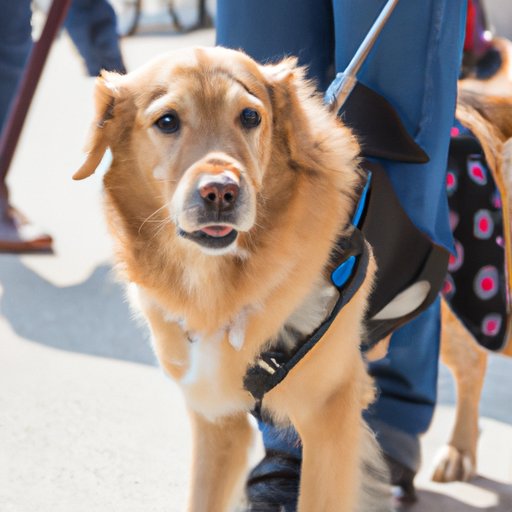Introduction
If you’ve encountered a service dog, perhaps you’ve wondered what their purpose is or what sets them apart from a typical pet. A service dog is a specially trained animal that assists their handler with tasks to enhance their quality of life, and they play an important role in the lives of many people. Understanding the value of service dogs is crucial, as it provides a foundation of knowledge for how these dogs serve individuals with disabilities, medical conditions, and more.
Unleashing the Truth: Understanding the Role of Service Dogs
According to the Americans with Disabilities Act (ADA), a service dog is defined as a dog that is specially trained to perform tasks for an individual with a disability. These tasks could range from guiding individuals with visual impairments, alerting those with hearing impairments, or detecting medical conditions such as seizures or blood sugar changes. These highly trained dogs provide independence and security to their handlers, helping them to navigate the world with confidence and ease.
From Companions to Lifesavers: The Importance of Service Dogs
Service dogs often form close bonds with their handlers, and in many cases serve as not just a companion, but a lifeline. There are countless stories of how service dogs have transformed the quality of life for their handlers, from drastically reducing the frequency of seizures to providing much-needed emotional support. Research has consistently shown the numerous psychological and physical benefits of service dog ownership, including increased well-being, reduced stress, and improved cardiovascular health.
The Ultimate Guide: Everything You Need to Know about Service Dogs
Training standards and certifications for service dogs vary by country or jurisdiction, but typically require an extensive training process to ensure the dog is capable of performing the necessary tasks and behaving appropriately in public. Laws regarding service dogs also vary by location, but generally require public access for service dogs and accommodations made for individuals with service dogs, such as businesses allowing service dogs to enter or providing space for the dog to work. It is important for handlers and other individuals to understand these laws in order to ensure the proper treatment of service dogs.
Paws for a Cause: How Service Dogs Are Changing Lives
Several organizations exist to provide service dogs to those in need. These organizations rely heavily on donations and fundraising, as the cost of training and providing a service dog can be significant. Donations may cover the expenses of acquiring, raising, and training the dog and even cover costs such as vet bills or future training needs. Supporting these organizations can provide life-changing support to handlers and their families and help raise awareness about the value of service dogs.
Conclusion
Service dogs are an important part of many individuals’ lives, providing assistance and companionship in unique ways. Educating oneself about the roles and needs of service dogs is key to ensuring their well-being and recognizing their value in society. Join us in spreading awareness and supporting service dog organizations that help individuals to live their lives to the fullest.
